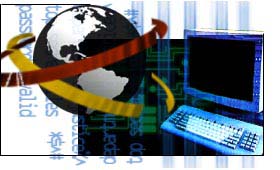 |
Political Science on the Internet ps.358 |
 |
Political Science on the Internet ps.358 |
|
Syllabus
This class provides a study of the relationship between politics and the Internet. First, the course examines the concepts of virtual community, cyberpolitics, and electronic democracy. It also provides an analysis of how politics and democracy are being changed by the use of the Internet. Second, this class investigates how political actors use the Internet to influence politics off-line. Candidates, public officials, political parties, interest groups, and individual citizens use the Internet as a tool for promoting their political goals. We will study how the Internet is used by these political actors to distribute information, communicate about politics, campaign, lobby, organize, and advocate policy positions. Third, this class analyzes the legal, ethical and cultural problems resulting from the use of the Internet. Numerous problems have surfaced as a result of the popularity of the Internet. Among these are: libel, copyright, privacy, the right of every citizen to participate in cyberpolitics, free speech, pornography, and censorship. Fourth, this class examines the impact of the Internet on the political system. The Internet offers the potential for improving democracy in a number of way. It can increase citizen levels of information, reduce the cost of acquiring information and provide an opportunity to engage in direct democracy through electronic technology. At the same time the Internet has the potential to impact the political system negatively. It offers an opportunity to distribute false information, help to organize lunatic fringe groups, invade privacy and restrict political participation to a technological elite. We will examine both sides of this debate. Course Objectives: 1. To provide basic knowledge and analytical abilities to more fully comprehend political influences of the Internet on politics. 2. To integrate the Internet into the classroom experience through a series of hands-on student projects. 3. To help students become aware of the wide range of political science resources available on the Web. 4. To train students on how to use political resources available on the Internet and refine their ability to critique these resources. 5. To guide students through the “virtual library” of political science in order to stimulate and motivate students to explore the world of cyberpolitics. 6. To increase student ability to articulate and participate in issues of cyberpolitics in written format by completing written assignments and participating in electronic discussions. 7. To enable students to become effective participants in the politics of cyberspace. Use of the Internet with this Course: This course has a Web-component. It departs from a traditional course in several ways. The class uses electronic readings in place of a textbook, online research in place of library research, electronic discussion to supplement classroom discussion, written lectures as well and an email method to supplement advising and answering student questions. Much of the work you will do for this course will have a hands-on character. That is, you will learn about politics on the Internet by using the Net. The Web site is designed to help guide you through this process. It contains assigned readings, Internet exercises, and Internet resources to help you do assignments. Staying Informed: It is a real challenge to keep up with the changes that are taking on
the Internet all the time. Three very good sources are Politics
Online , Computerworld and PC
Magazine. The former
covers the latest issues while the latter list newspaper outlets on the
Net. Also be sure and check out the Reference
page on this Website.
Participation in Electronic Discussion: We will use Blackboard for an electronic bulletin board. The bulletin board will provide an opportunity to conduct discussions that are threaded, that is, the board keeps a record of what everyone posts to it. Messages can be posted or reviewed at any time. Goals of Electronic Discussion:
Assigned Reading:
Grades will be determined by the following components: internet projects 40% ,questions from the readings 40% and listserv and bulletin board discussions 20%. |
|
|
||
| Questions: Joe
Gaziano
Lewis University, One University Parkway, Romeoville, Il.,60446 |
||
 |
||||